
This was CNBC's live blog tracking developments on the war in Ukraine.
Jailed Russian opposition leader Alexei Navalny died on Friday, Russian state media reported, citing the prison service of the Yamalo-Nenets region where he had been serving his sentence.
No details are yet available as to the cause of death, and Navalny's press secretary said in a post on X that she had yet to receive any confirmation of his demise. CNBC could not independently verify the report.
Meanwhile, Ukrainian President Volodymyr Zelenskyy will visit Germany and France on Friday in a bid to secure crucial military assistance and bilateral security commitments to help repel the Russian invasion.
Berlin and Paris could become the second and third Ukrainian allies to sign bilateral security pledges with Kyiv, after the U.K.'s January deal. The commitments aim to shore up military support until Ukraine can achieve its long-coveted NATO membership.

The trip, Zelenskyy's first foreign excursion since replacing his popular army chief, comes as Ukrainian troops are withdrawing from some areas of the eastern town of Avdiivka to seek better positions after months of intense combat.
Money Report
Military spokesperson Dmytro Lykhoviy said in televised remarks that one of Ukraine's most renowned fighting units, the Third Assault Brigade, had been scrambled to Avdiivka as reinforcement, according to Reuters.
"The situation on the battlefield is heavy and basically we're still at the same hard phase of war as it was for the last year. The frontline has not been moving significantly at any side, meaning that to hold the front is the fight itself," Ukrainian Deputy Prime Minister Olga Stefanishyna told CNBC at the Munich Security Conference on Friday.
Feeling out of the loop? We'll catch you up on the Chicago news you need to know. Sign up for the weekly> Chicago Catch-Up newsletter.
Russian prosecutors warn citizens against mass rally in Moscow after Navalny's death
The Russian prosecutor's office has warned Russians against participating in a mass protest in the centre of Moscow after the death of opposition leader Alexei Navalny.
"Please note that this mass event has not been coordinated with the executive authorities of the city in accordance with the procedure established by law," the prosecutors said.
According to videos and photos on social networks, people in other Russian cities were paying their respects to Navalny after news of his death spread.
— Reuters
World leaders react with horror to reports of Putin critic Navalny’s death
World leaders on Friday expressed alarm and suspicion following reports of the death of prominent Russian opposition leader Alexei Navalny in a Siberian penal colony.
Russian media reported, citing the prison service of the Yamalo-Nenets region where Navalny had been serving a lengthy sentence, that he had fallen ill and collapsed after a walk.
NATO Secretary General Jens Stoltenberg said he was "deeply saddened and concerned" about the reports, whilst U.S. Vice President Kamala Harris said Russia was responsible.
Russia's Foreign Ministry said the response to Navalny's reported death from Western leaders is "self-exposing" at a time when no forensic medical examination is yet available.
— Sophie Kiderlin, Elliot Smith
U.S. Sen. Chris Coons: 'In the next front against Russia, it will be Americans on the front lines'
The U.S. faces the prospect of direct combat with Russia if it fails to provide continued financial and military support for forces on the ground in Ukraine, U.S. Democratic Senator Chris Coons said Friday.
Calling for bipartisan support from the U.S. House of Representatives for a new $95 billion aid package which includes funds for Ukraine, Coons said that investment in Europe was the U.S.'s best defense against Moscow.
"In the next front against Russia, it will be Americans on the front lines," Coons told CNBC's Silvia Amaro at the Munich Security Conference.
"We are best off investing in the Ukrainians who are fighting bravely for their own freedom than allowing Putin the opportunity to spread further chaos and violence across Europe."
The U.S. Senate on Tuesday approved the new funding package, but it faces tough opposition from House lawmakers.
— Karen Gilchrist
Ukrainian says its withdrawal from parts of Avdiivka does not give Russia a strategic advantage

Ukraine on Friday said that its withdrawal from parts of the fiercely contested town of Avdiivka in the east of the country does not give Russia a strategic advantage.
"Tactically, the occupation of these positions does not give the enemy a strategic advantage and does not change the situation within the Avdiiv defense operation," Oleksandr Tarnavskyi, the commander of Ukraine's forces in the southeast, wrote in a post on Telegram, according to a Google translation.
He said the decision to leave was motivated by the goal to protect Ukrainian personnel and to "improve the operational situation."
In a separate post he said that those Ukrainians still fighting in Avdiivka were being supplied with additional ammunition and weapons and that there was a plan to reinforce units there.
— Sophie Kiderlin
Germany, Ukraine sign agreement on long-term support and cooperation

German Chancellor Olaf Scholz and Ukrainian President Volodymyr Zelenskyy on Friday signed an agreement detailing "security cooperation and long-term support" between the two countries.
The agreement said that Germany would provide "unwavering support for Ukraine for as long as it takes." This includes assistance such as training Ukrainian military forces and law enforcement agencies, and the provision of military equipment including air defence, ammunition, armoured vehicles and artillery.
The agreement, which is valid for ten years, also covers areas such as economic and political support, including relating to reforms that aim to align Ukraine more closely with the European Union.
In posts on social media platform X, Zelenskyy said he was grateful to Germany and its people for their solidarity and support, while Scholz said the agreement was a "historic step."
German defence secretary Boris Pistorius said in a statement shared on X that a fresh aid package worth 1.13 billion euros ($1.22 billion) which focuses on air defence and artillery had also been agreed upon.
— Sophie Kiderlin
Sen. Coons says he's long been impressed by Navalny's courage and determination
U.S. Senator Chris Coons (D-Del.) told CNBC on Friday that he had long been impressed by Alexei Navalny's "courage" and "determination."
"The world watched in horror at an attempted assassination by poisoning several years ago, and that he chose to go back to Russia, to continue to try and be a voice for democracy, a voice for the Russian people, was inspiring," Coons said, adding that reports of Navalny's death were "heartbreaking."
— Elliot Smith
Jailed Putin opponent Alexei Navalny has died, Russian media says
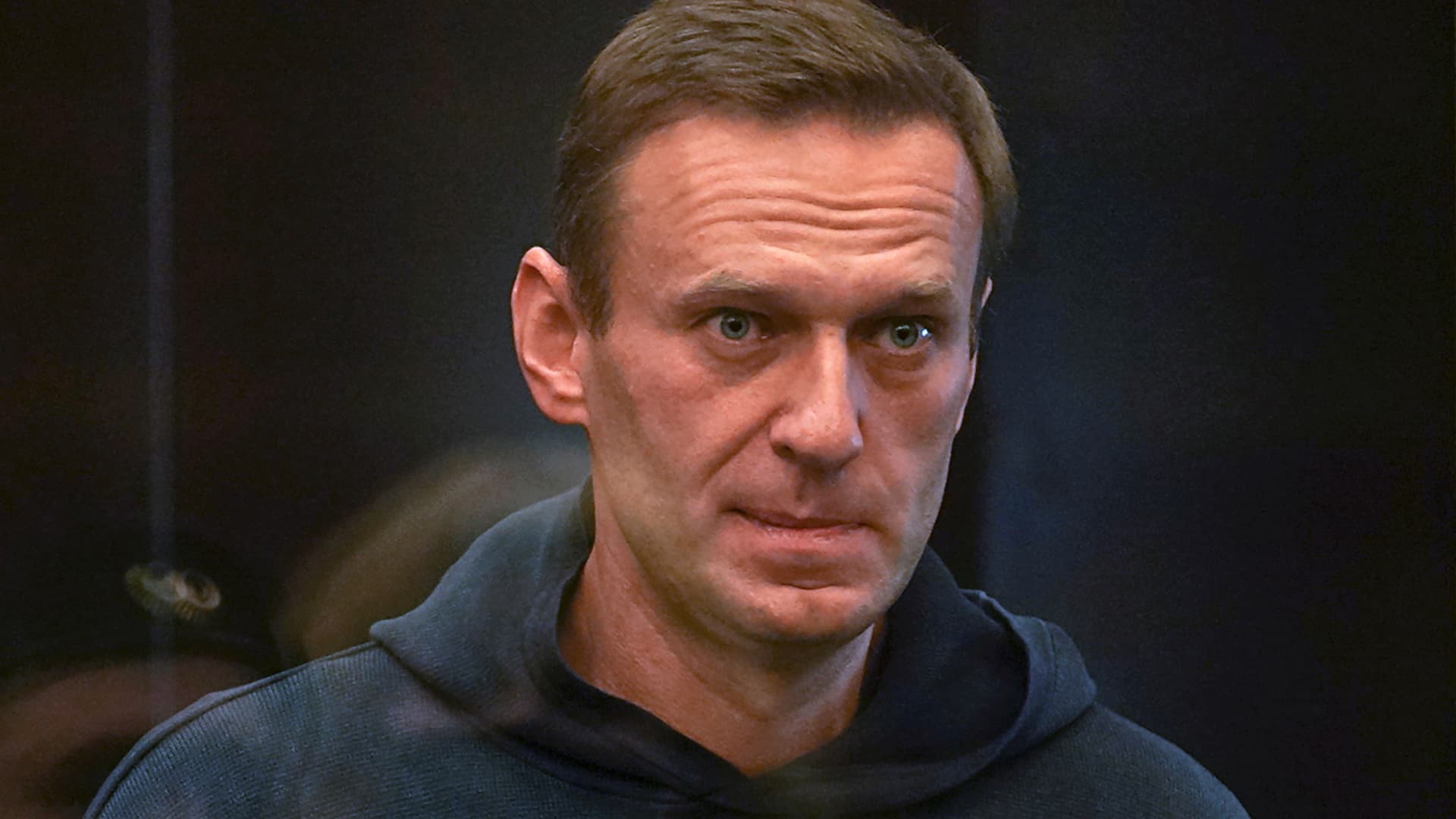
Imprisoned Russian opposition politician Alexei Navalny has died, state news agency Tass reported on Friday, citing the prison service of the Yamalo-Nenets region where he had been serving his sentence.
Navalny was one of Russian President Vladimir Putin's most vocal critics and had been serving a 19-year jail term. Navalny's press secretary Kira Yarmysh said in a Google-translated post on X that she had yet to receive confirmation of his death.
"The Federal Penitentiary Service in the Yamalo-Nenets District is disseminating news about the death of Alexei Navalny in IK-3. We don't have any confirmation of this yet," she said, according to a Google translation.
"Alexey's lawyer is now flying to Kharp. As soon as we have any information, we will report it."
CNBC could not independently verify the report.
- Elliot Smith
Russian central bank holds interest rates at 16%, ending run of five straight hikes

The Central Bank of Russia on Friday kept the country's key interest rate unchanged at 16%, bringing to an end a run of five successive hikes since last summer.
The central bank noted that inflationary pressures "have eased compared with the autumn months but remain high."
"The return of inflation to target in 2024 and its further stabilisation close to 4% assume that tight monetary conditions will be maintained in the economy for a long period," the board of directors said in its report.
Domestic demand is still outstripping production capacity for goods and services, the report added, meaning that a "judgment on the sustainable nature of emerging disinflationary trends would be premature."
Prior to Friday's pause, the central bank had lifted rates by 850 basis points since July, which included an emergency off-diary hike in August amid a plunge in the value of the ruble and pressure from the Kremlin.
- Elliot Smith
Ukrainian deputy prime minister says front line 'has not been moving significantly' either way

Ukrainian Deputy Prime Minister Olga Stefanishyna told CNBC on Friday that the war has reached something of a stalemate on the front lines, as she prepares for meetings with allies and partners at the Munich Security Conference.
"The situation on the battlefield is heavy and basically we're still at the same hard phase of war as it was for the last year, the front line has not been moving significantly at any side, meaning that to hold the front is the fight itself," Stefanishyna told CNBC's Silvia Amaro on the sidelines of the conference.
She said Kyiv was focused on advancing its technological capabilities and securing the Black Sea, where the military has carried out some "bright operations" in recent months.

"The most complicated part is that still we face a mass of missile attacks throughout the territory of Ukraine, and so far Ukrainians feel safe in most of the areas of Ukraine because they know that the sky is secured," Stefanishyna added.
Ukrainian President Volodymyr Zelenskyy will attend the Munich Security Conference on Saturday, as Kyiv looks to secure further military assistance in the face of persistent delays in Washington.
Stefanishyna had a message for U.S. Congress, where the Senate's $95 billion aid bill faces an uphill battle in the Republican-led House of Representatives.

"We're dying and we might die and not be standing here, so it's vital for me and the 48 million Ukrainians," she said, adding that if Ukraine endured further suffering due to politicians' failure to agree on support, Kyiv "would remember that, of course."
"Moreover, I think the major message on my side is that there is no way for Ukraine not to prevail in this war, there is no way [for] Europe not to restore it's security and peace, there is no way [for] Europe not to become stronger, more capable to defend itself — it's only a matter of time."
— Elliot Smith
Zelenskyy heads to Berlin and Paris in hope of signing bilateral security deals

Ukrainian President Volodymyr Zelenskyy is expected to visit Germany and France on Friday in a bid to secure crucial military assistance and bilateral security commitments.
Berlin and Paris could become the second and third Ukrainian allies to sign bilateral security pledges with Kyiv, after the U.K. signed a cooperation agreement in January that vowed to provide "comprehensive assistance to Ukraine for the protection and the restoration of its territorial integrity within its internationally recognised borders."
With U.S. military aid held up for months by Republicans in Congress, Ukraine is struggling with a shortage of ammunition stockpiles, particularly in combat hot spots such as the eastern city of Avdiivka.
"We are making every effort to ensure that these agreements are strong for Ukraine, and I am confident that they will be," Zelenskyy said in a post on X.
"We are developing a new security architecture for our country that will benefit us not only here and now, but also in the long run. This is something Ukraine never had but has always needed."
— Elliot Smith
Ukraine withdraws some troops from Avdiivka, sends in elite unit

Ukrainian troops are withdrawing from some areas of the eastern town of Avdiivka to seek better positions after months of intense combat.
Military spokesperson Dmytro Lykhoviy said in televised remarks that one of Ukraine's most renowned fighting units, the Third Assault Brigade, had been scrambled to Avdiivka as reinforcement, according to Reuters.
The city lies just north of the regional center of Donetsk, and capturing it is critical to Russia's goal of securing total control of the Donetsk and Luhansk provinces, which make up the industrial Donbas region of eastern Ukraine.
Moscow has devoted substantial battlefield resources to encircling and capturing the city, and Ukraine's dwindling supply lines have left its forces vulnerable.
In a post on the Telegram messaging app on Thursday, the Third Assault Brigade confirmed it was "urgently redeployed to strengthen Ukrainian troops in the Avdiivka area," and describe the situation there as "hell," according to a Google translation.
"We are forced to fight at 360 degrees against new and new brigades that the enemy is bringing in," Commander Andriy Biletskyi was quoted as saying, while the post described the situation as "threatening and unstable."
"The enemy continues the active rotation of its troops, and throws new forces and means into the city," it added.
— Elliot Smith
White House confirms Russia is developing an 'antisatellite capability'

The White House on Thursday confirmed that Russia is developing an "antisatellite capability."
National Security Council spokesperson John Kirby told a press briefing that "there is no immediate threat to anyone's safety" and that the device is "not an active capability and it has not yet been deployed."
The intelligence declassified by the government does not confirm whether there is a nuclear component to the Russian weapon, but Kirby said it "would be a violation of the Outer Space Treaty to which more than 130 countries have signed up, including Russia."
The Wall Street Journal reported Wednesday that the remaining classified information suggests Moscow is trying to develop a nuclear weapon in space to target satellites.
— Elliot Smith
Photos show Polish farmers demonstrating over food imports from Ukraine
Photos published via Getty Images on Thursday showed tractors blocking a road during a demonstration by Polish farmers and protesters gathered outside local offices for the European Commission in the southwestern city of Wroclaw.
Polish farmers have been protesting against the European Union's agriculture policies, including allowing cheap grain imports from Ukraine.
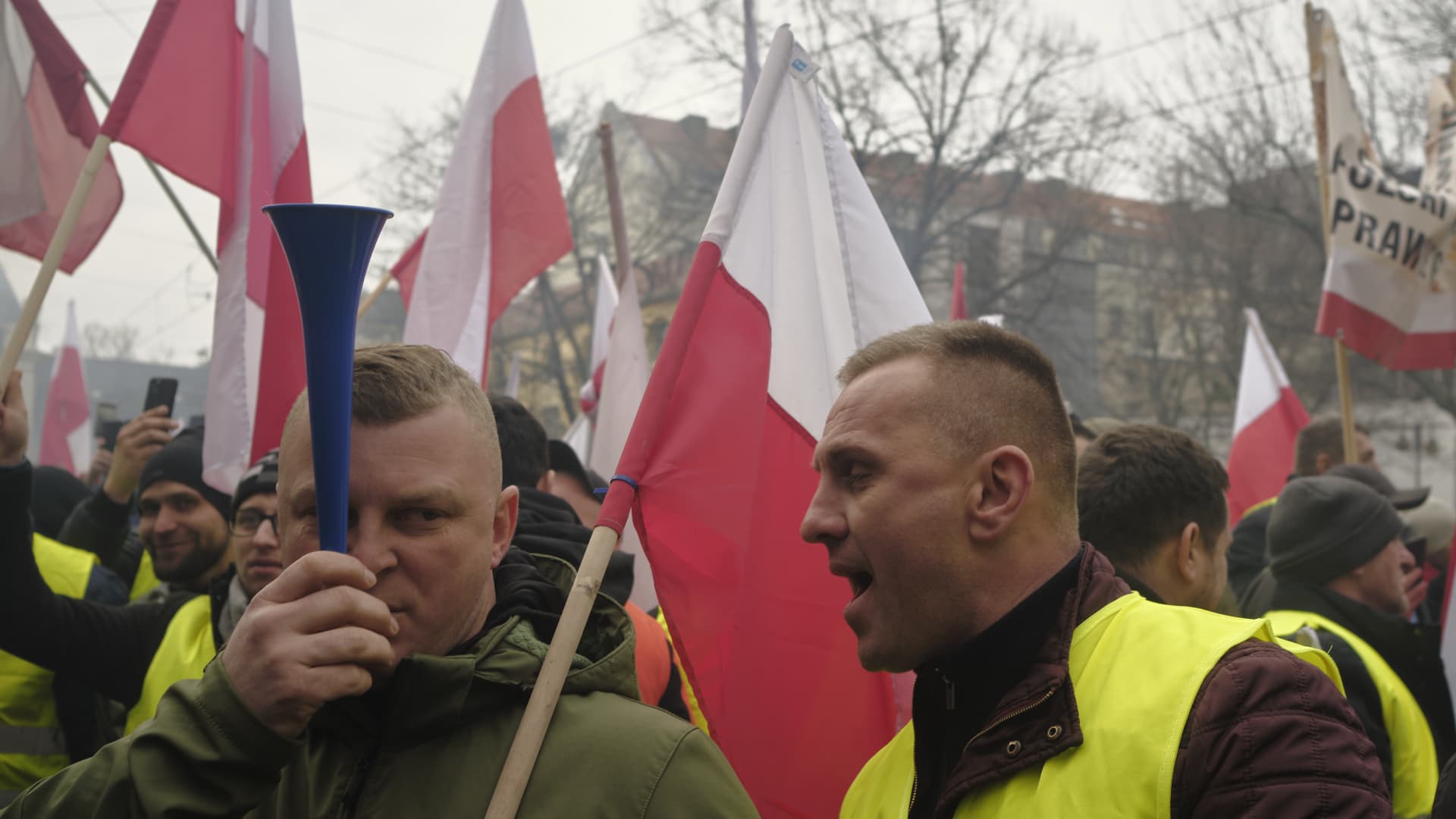
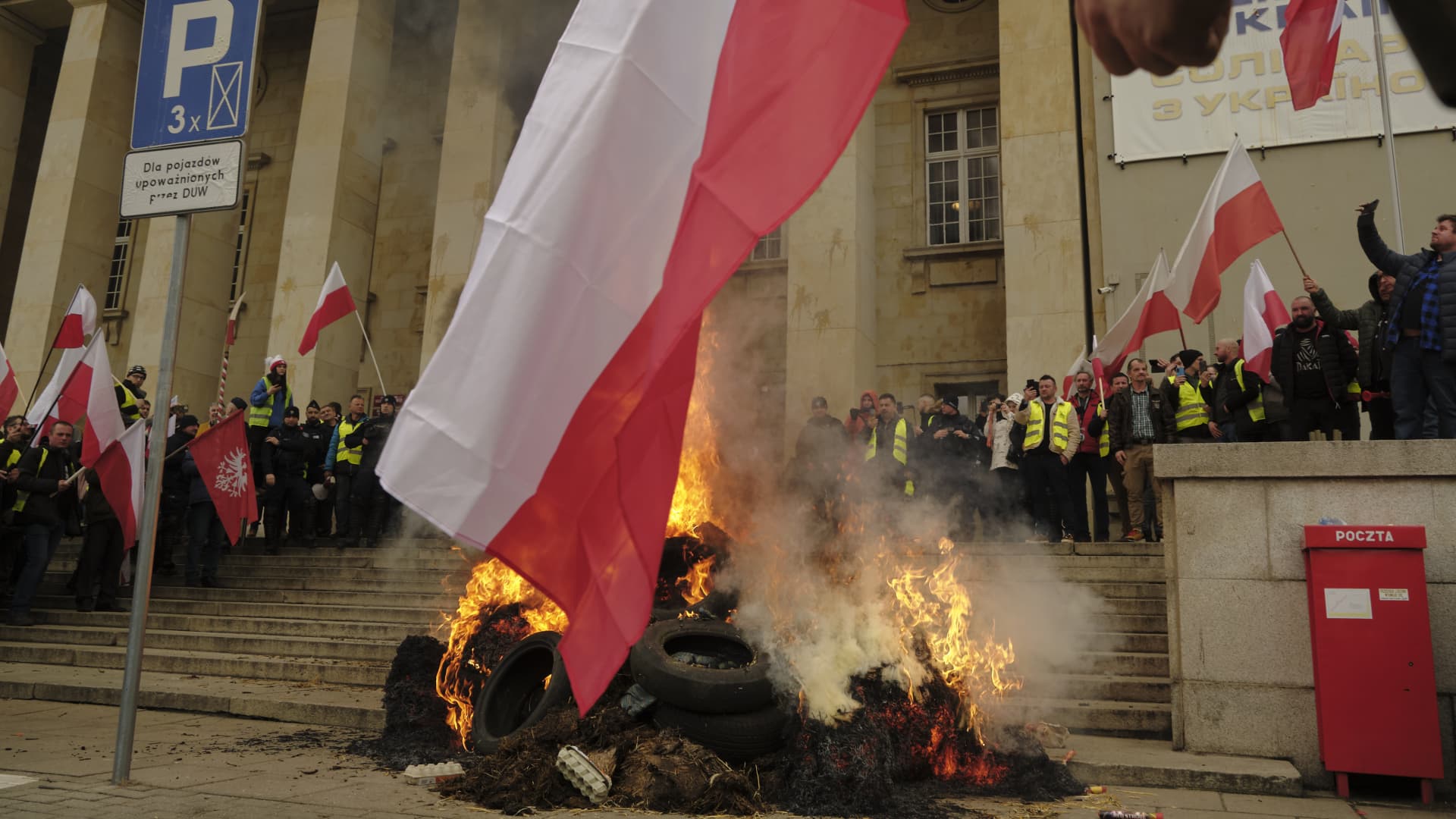
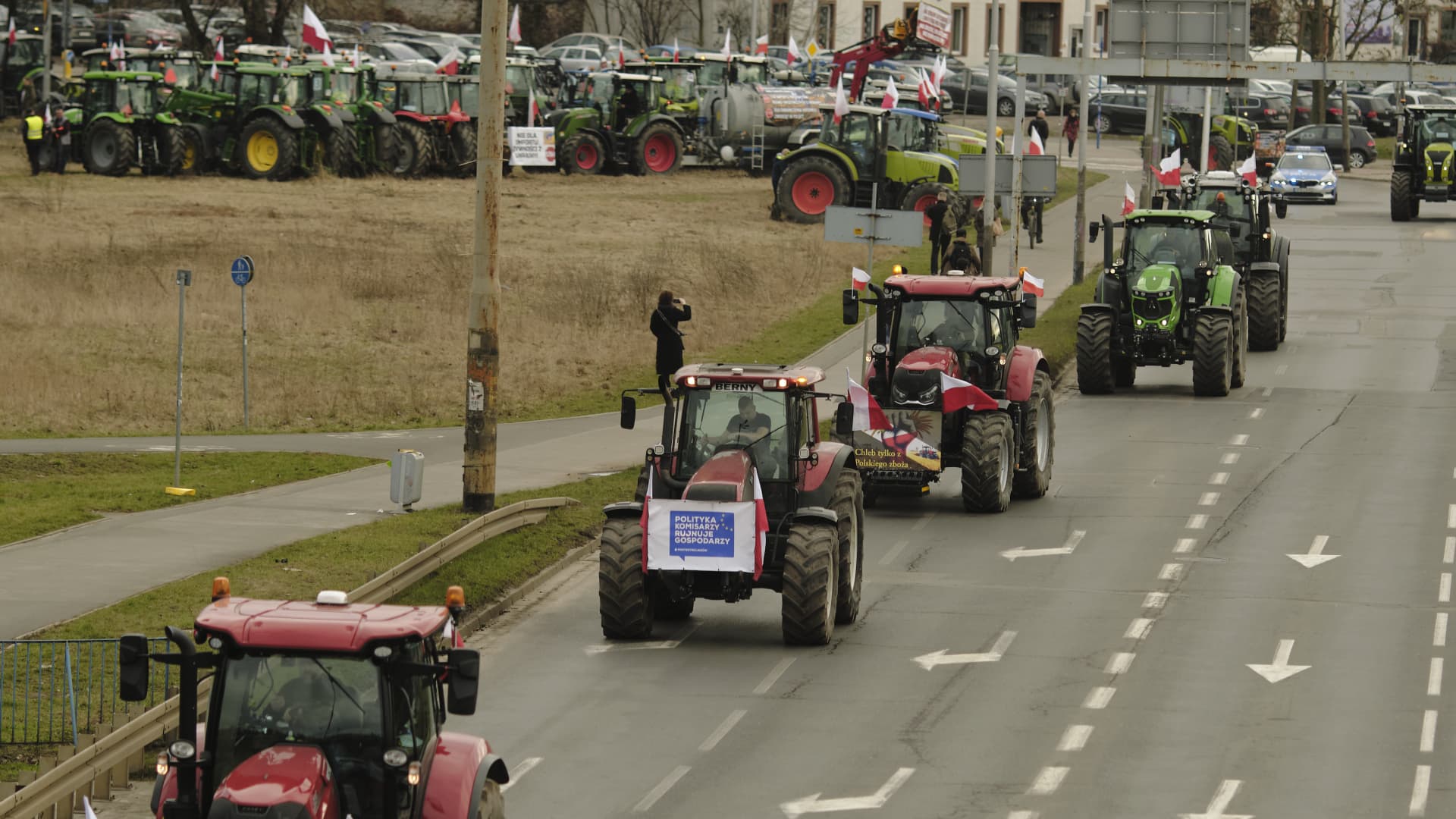
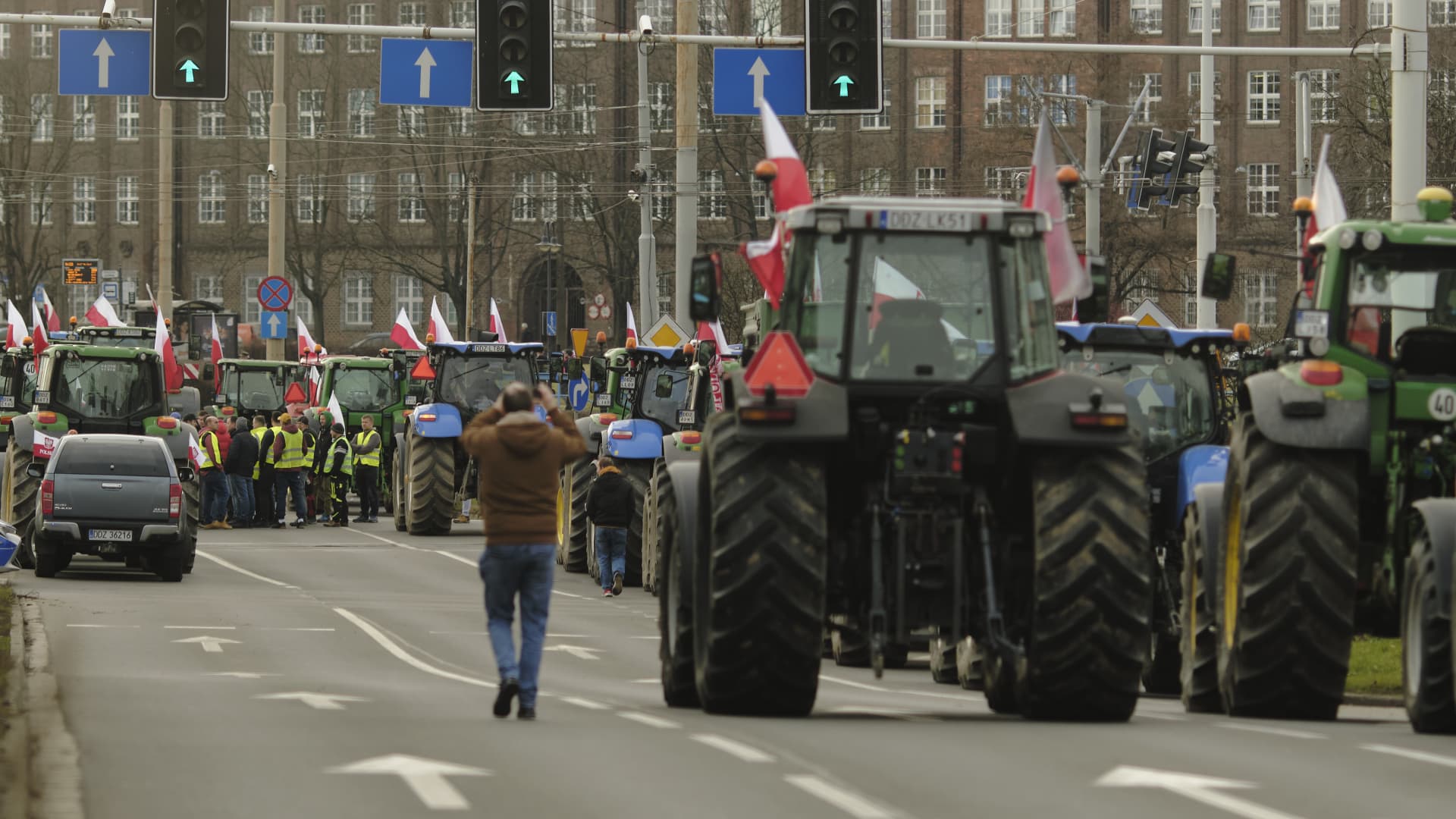
— Sam Meredith
Russian court rejects two appeals by barred anti-war election candidate
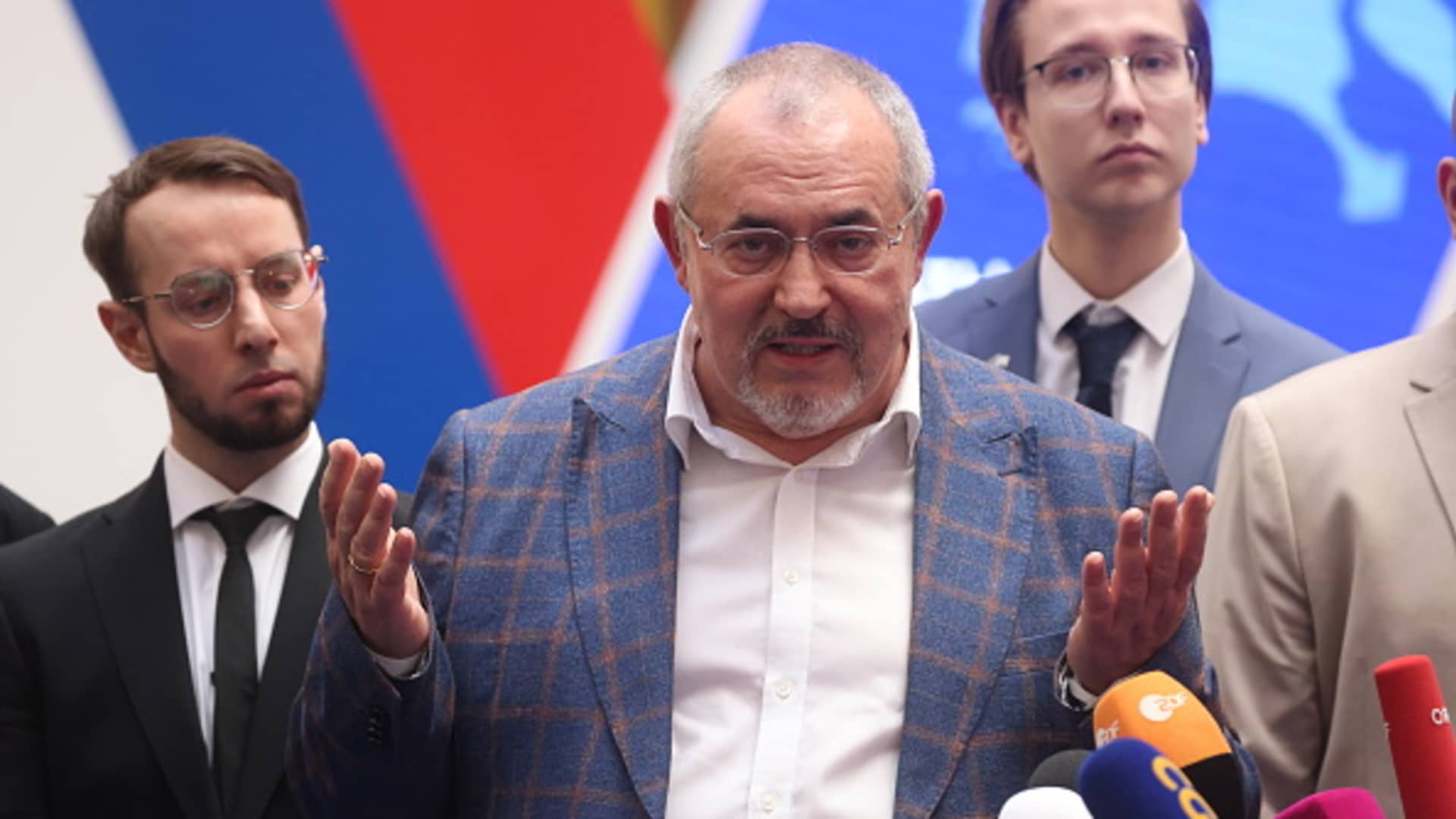
Russia's Supreme Court on Thursday rejected two legal challenges by anti-war candidate Boris Nadezhdin after he was disqualified from next month's presidential election, Nadezhdin said.
Nadezhdin had hoped to stand against President Vladimir Putin but was barred last week by the electoral commission, which said it found irregularities in the list of supporters' signatures he had presented in support of his candidacy.
— Reuters
Putin says he prefers Biden over Trump for U.S. election
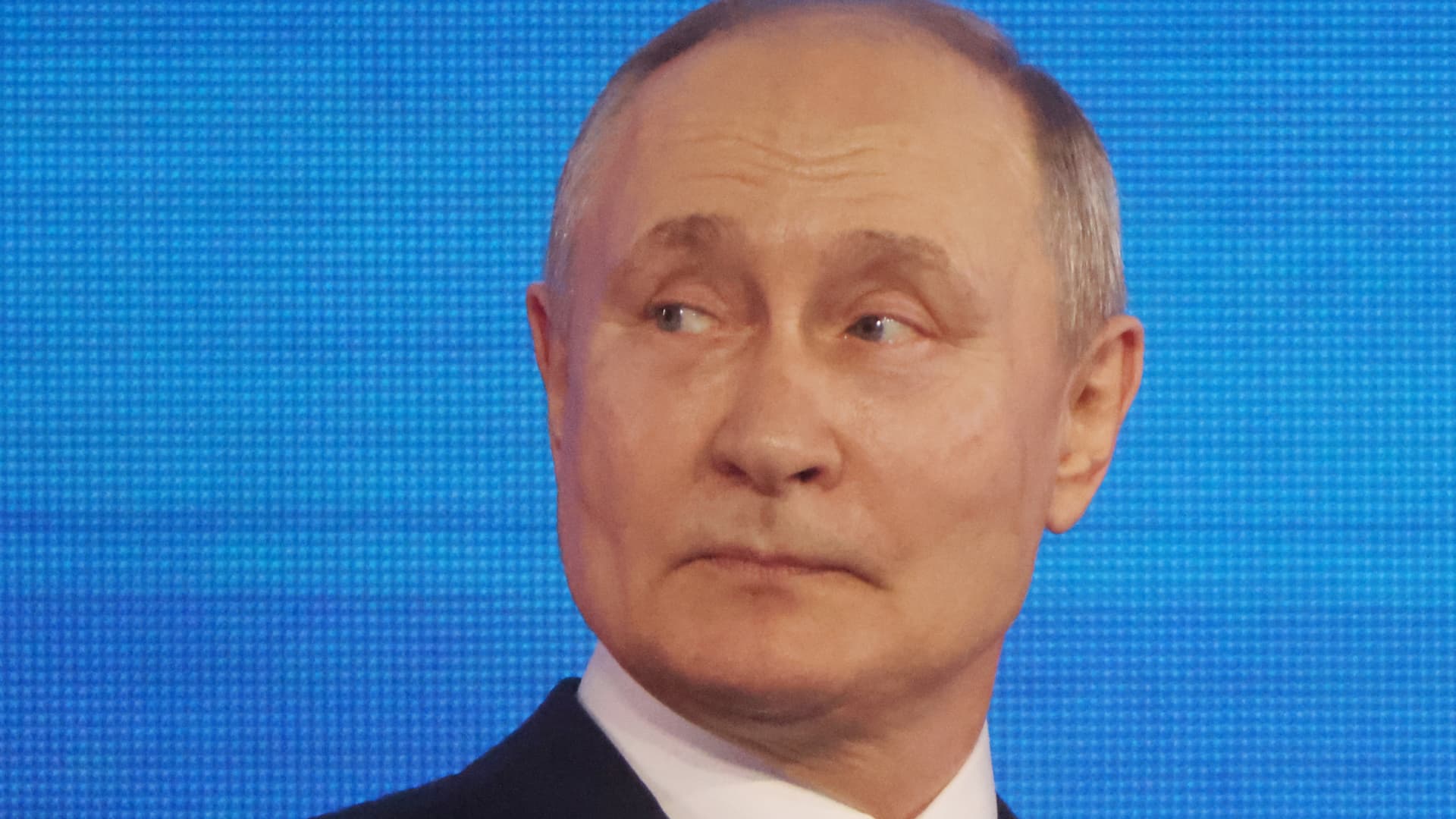
Russian President Vladimir Putin said he preferred Joe Biden as the next U.S. president over Republican frontrunner Donald Trump, who fell under intense scrutiny for his relationship with the Kremlin during his presidency.
″[Biden] is more experienced and more predictable. He is an 'old school' politician. But we will work with any U.S. leader, elected by the people of America," Putin told journalist Pavel Zarubin late Wednesday, according to Russian state-controlled news outlet Tass.
The Trump and Biden presidential campaigns did not immediately respond to CNBC's requests for comment.
Read the full report here.
— Ruxandra Iordache
Read CNBC's previous live coverage here:
13 Russian missiles shot down as Kyiv comes under fire; Zelenskyy vows to 'clear the Black Sea'






